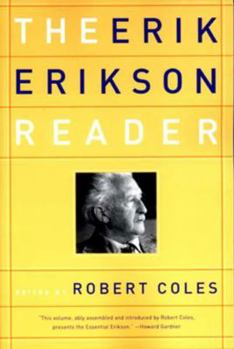The Erik Erikson Reader
Select Format
Select Condition 
Book Overview
Erik H. Erikson is recognized as one of the world's leading figures in the field of psychoanalysis and human development. His ideas about the stages of development, the sources of identity, and the interdependence of individual growth and historical change revolutionized our understanding of the nature and course of psychological growth. Erikson, whose work first described the now familiar concepts of "identity crisis" and "life cycle," provided an unprecedented framework for considering the individual psyche within society and culture. Unveiling a dynamic process of psychological development, he emphasized the tendency toward growth and the integration of multiple influences--the biological, social, psychological, cultural, and historical. With writings from Erikson's entire career, including major work from Childhood and Society, Insight and Responsibility, Young Man Luther, and Gandhi's Truth, this invaluable reader charts the influence of Erikson's thinking in the areas of child psychology, development through the lifespan, leadership, and moral growth.
Format:Paperback
Language:English
ISBN:039332091X
ISBN13:9780393320916
Release Date:March 2001
Publisher:W. W. Norton & Company
Length:528 Pages
Weight:1.59 lbs.
Dimensions:1.3" x 5.9" x 9.0"
Customer Reviews
1 rating
integrated historical, psychological and political theories
Published by Thriftbooks.com User , 20 years ago
Erik Erikson (1902-1994), famous German-American psychotherapist, was born in Frankfurt, his biological father was a Dane remained unnamed, his mother, Karla Abrahamsen, was a young Jewish woman, who married three years after Erik's birth Dr. Theodor Homberger. During the Nazi period the family emigrated to the USA, where Erik indicated the surname "Erikson" (chosen freely) for the immigration authority. Because his parents at first hid the biological identity from young Erik, at first he had felt as Erik Abrahamsen-Homberger; the modification into the well sounding "Erik Erikson" was (of course) connected with the search for his biological (unsolved, Danish) "Roots". His books about "identity crisis", "life circles", about "Childhood and Society" and so on: practice an analysis of both common and personal interest. His own curriculum vitae is an example of developing an identity as well as the subjects he tried to describe (Luther, Hitler, Gandhi ...); Not only, that in his childhood (in Nuernberg) his Jewish identity was hidden completely (favored by a fair-haired outside) in the Nazi Germany; at first it was his aim in his student time of becoming an artist. He slept under bridges, walking through Europe. Later he always tended more towards the psychological knowledge area, could be trained to a Montessori teacher, influenced by his friend Peter Blos, then (in Vienna) he managed to get a psychoanalysis by the famous daughter of Sigmund Freud, Anna; after that (emigrated to the USA) he started with ethnological researches at the Dakota Indians: so his own identity changed gradually in the course of his life. The geographical changes surely also caused a personality alteration: In Vienna he became acquainted with his later wife Joan Serson, a Canadian dance teacher; avoiding the Nazis, the family went to Copenhagen (searching for roots), then to Boston. He finally took lectureships for the University of Harvard, then Yale, then Berkeley. In the fifties he developed disgust of the McCarthy era and let rest his teaching for several years. His remark "Identity is the intersection point between what a person wants to be and what the world allows to be" is more than only illustrated by the changeable outside worlds in Erikson's biography. It is worthwhile to look at his additional publications (after his major work "Identity and the Life Cycle"), too: he analyses Hitler, Gorki and the conditions of life of the Sioux Indian tribe "Oglala Dakota" ( in "Childhood and Society"). For his book "Gandhis truth" he got the Pulitzer Price. Focusing the interdependence of individual growth and historical change (Young Man Luther, A Study in Psychoanalysis and History) he was the important founder of multiple-method-search-procedures for integrated historical, psychological, social and political theories. The question of the development of identity therefore is Erikson's main topic, which is experienced at his own body - essentially for everyone, who






